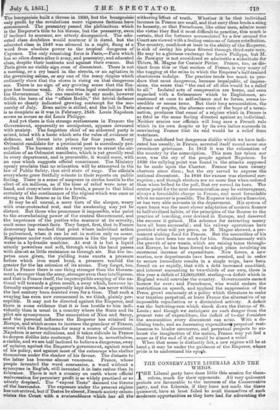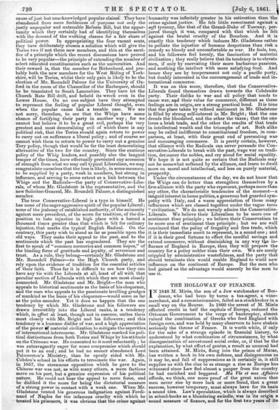THE CONSERVATIVE LIBERALS AND THE WHIGS. T HE Liberal party have
done little this session for them- selves, much for their opponents. All very quiescent periods are favourable to the increase, of the Conservative party, and the Liberals, if they have not made the times quiescent, have at least failed to avail themselves of such moderate opportunities as they have had for advocating the cause of just but unacknowledged popular claims. They have abandoned from mere feebleness of purpose not only the justly unpopular and untenable Reform Bill, but the oppor- tunity which they certainly had of identifying themselves with the demand of the working classes for a fair share of political power. In appropriating the four vacant seats, they have deliberately chosen a solution which will give the Tories two if not three new members, and this at the sacri- fice of a principle which the recent discussions have proved to be very popular—the principle of extending the number of select educated constituencies such as the universities. And their reward is, that the member for Birkenhead, and pro- bably both the new members for the West Riding of York- shire, will be Tories, whilst their only gain is likely to be the election of Mr. Roundell Palmer for the University of Ox- ford in the room of the Chancellor of the Exchequer, should he be translated to South Lancashire. They have let the Church Rate Bill drift, and beheld its wreck even in the Lower House. On no one subject have they attempted to represent the feeling of popular Liberal thought, even when the popular cause had a tenable case. We are not sorry, therefore, to see that the Whigs have some chance of fortifying their party in another way ; for we cannot but believe it to be a great evil, perhaps the very greatest and most demoralizing evil of which there is any political risk, that the Tories should again return to power to carry out on sufferance a liberal policy ; and of course we cannot wish them to return to power to carry out a genuine Tory policy, though that would be far the least demoralizing alternative of the two for the country. Since the cautious policy of the Whig leaders, and possibly also the languid temper of the times, have effectually prevented any accession of strength from what we may call typical Liberalism, we may congratulate ourselves that the loss is likely, in some measure, to be supplied by a party, weak in numbers, but strong in influence, and serving to some extent as a link between the Whigs and the Radicals—the party of Conservative-Libe- rals, of whom Mr. Gladstone is the representative, and the new Solicitor-General, Mr. Roundell Palmer, a distinguished member.
The true Conservative-Liberal is a type in himself. He has none of the eager aggressive spirit of the popular Liberal ; none of the jealousy of established authority, of the animosity against mere precedent, of the scorn for tradition, of the dis- position to bate injustice in high place with a hatred a thousand times greater than that which is felt for ordinary injustice, that marks the typical English Radical. On the contrary, this party wish to stand as far as possible upon the old ways. They make their appeal to the past, and to the sentiments which the past has engendered. They are the first to speak of "common memories and common hopes," of the binding force of gratitude and loyalty, of reverence and trust. As a rule, they belong—certainly Mr. Gladstone and Mr. Roundell Palmer--to the High Church party, and rely upon the evidence of tradition for the essential articles of their faith. Thus far it is difficult to see how they can have any tie with the Liberals at all, least of all with that peculiar section of Liberals with which they are most closely connected. Mr. Gladstone and Mr. Bright—the man who appeals to historical sentiments as the basis of his eloquence, and the man who appeals to the passionate levelling grudges of mankind as the basis of his eloquence—would seem as far as the poles asunder. Yet it does so happen that the one tendency by which Mr. Gladstone and his followers are drawn irresistibly into the Liberal ranks, is a tendency which, in efAct at least, though not in essence, unites them most closely with Mr. Bright and his followers ; and this tendency is a humane dislike of war, and a high appreciation of the power If material civilization to mitigate the asperities of international intercourse. Mr. Gladstone marked his poli- tical distinctness from both Tories and Whigs by his attitude on the Crimean war. He consented to it most reluctantly ; he was extravagantly eager for some compromise which should put it to an end ; and he had no sooner abandoned Lord Palmerston's Ministry, than he openly sided with Mr. Cobden's school in his efforts to terminate the war. Again, in 1857, the strenuous opposition which he gave to the Chinese war was not, as with many others, a mere factious move on his part, but a genuine expression of his political nature. He could not bear the appeal to mere force, and he disliked it the more for being the dictatorial measure of a strong power in contact with a weak one. When Mr. Gladstone vented his generous indignation against Ferdi- nand of Naples for the infamous cruelty with which he treated his prisoners, it was obvious that the crime against humanity was infinitely greater in his estimation than the crime against justice. He felt little resentment against a soft tyranny, like that of the Grand-Duke of Tuscany, per- jured though it was, compared with that which he felt against the brutal cruelty of the Bourbon. And it is exactly this tendency which induces Mr. Gladstone rather to palliate the injustice of humane despotisms than risk a remedy so bloody and uncomfortable as war. He feels, too, and his followers feel keenly, the fascination of material civilization; they really believe that its tendency is to elevate men, if only by enervating their more barbarous passions, and soothing the intellect with more satisfying food. And hence they are by temperament not only a pacific party, but doubly interested in the encouragement of trade and in- ternational commerce.
It was on this score, therefore, that the Conservative- Liberals found themselves drawn towards the Cobdenite party. Their dislike to war and all policy that tends to cause war; arl their value for commerce different as these feelings are m origin, are a strong practical bond. It is true that the place taken by refined sentiment in Mr. Gladstone is filled by strong self-interest in Mr. Bright ; that the one dreads the bloodshed, and the other the taxes ; that the one loves a brisk trade, and the other the results of that trade in intellectual wealth and the triumphs of art. Both alike may be called indifferent to constitutional freedom, in com- parison, at least, with their great end of preventing war and encouraging commerce. It is pretty certain, however, that affiance with the Radicals can never persuade the Con- servative-Liberals to break with the past, wage war on tradi- tion, der.ounce the nobles, and cry aloud for social equality. We hope it is not quite so certain that the Radicals may not be somewhat softened by the alliance, and learn to dwell more on moral and intellectual, and less on purely material, prosperity. Under the circumstances of the day, we do not know that the Whigs can do better than strengthen themselves by a firm affiance with the party who represent, perhaps more than any other, the characteristic tendencies of the moment—a languid interest in home politics, a generous but guarded sym- pathy with Italy, and a warm appreciation of those many influences which are classed together under the vague terra "civilization." We do not warmly admire the Conservative- Liberals. We believe their Liberalism to be more one of sentiment than principle ; we believe their Conservatism to be more one of sentiment than principle ; but we are well convinced that the policy of frugality and free trade, which it is their immediate merit to represent, is a sound one ; and if it is their good fortune to effect the needful savings and extend commerce, without diminishing in any way tile in- fluence of England in Europe, then they will prepare the country for a policy nobler than their own. We are sorely crippled by administrative wastefulness, and the party that should terminate this would enable England to wield new influence on the continent of Europe. But the men who had gained us the advantage would scarcely be the men to use it.































 Previous page
Previous page